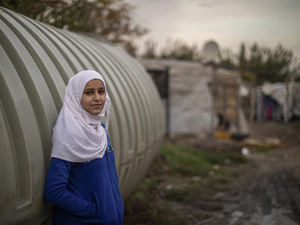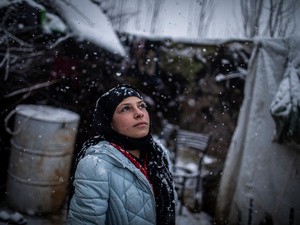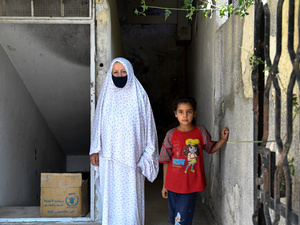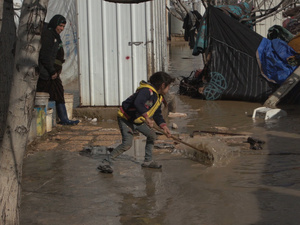Syrian refugees warily navigate the urban jungle of Amman
Syrian refugees warily navigate the urban jungle of Amman

Abdul watches television with his family in the apartment where they live in Amman. He's behind on the rent and worries how much longer they will be allowed to stay. © UNHCR/J.Kohler
AMMAN, Jordan, May 31 (UNHCR)– Abdul, a 37-year-old refugee from the northern Syria city of Aleppo, navigates the hardscrabble streets of Amman's Al Ashrafyeh district with watchful suspicion.
The slightly built father of four children, one of whom is sick, is careful not to spend too much time on the street. When he goes outside, he keeps to himself. "I don't interfere with anyone in this neighbourhood," he says. "I don't say anything. I don't deal with them."
There is a clear tension in Al Ashrafyeh, where Syrian families have arrived in search of shelter over the months. This refugee community is far from wealthy and there are concerns about the burden they may represent.
"The rents have gone up 100 per cent," says Mohammed, a 27-year-old electrician who has lived in the proud neighbourhood all his life. "The owners of the buildings prefer Syrians because they can use them and intimidate them. And when they are tired of them, they can tell them to go anywhere they want."
The past and the present have left Abdul with a feeling that the walls are closing in on him. He is unfamiliar with Jordan and worried about getting along, but also about how to make a living. On top of this, one of his sons, Mahdi, suffers from diabetes.
Abdul's life in sprawling Amman, the capital of Jordan, in many ways reflects the nature of the refugee crisis here. More than 800 days of civil war has placed a vice grip on the population. Increasingly preyed upon Syrians are leaving their country at a rate of 250,000 per month. Many of them are arriving in Amman, Lebanon's Beirut and other urban environments, where they seek to eke out a living.
The continuing conflict poses a threat to the entire region and has placed a great strain on host governments and communities, which time and time again have shown their generosity. Syrian refugees now account for a staggering 10 per cent of Jordan's population. Like Abdul, 75 per cent of refugees live outside camps, which means that invariably their presence will place a strain on the larger society.
UNHCR has taken steps to provide cash grants to some 40,000 individuals who are in desperate need of assistance. These families receive an average of US$125 a month to help cover the cost of rent and other essentials. With more funding, the agency would be able to distribute assistance to 4,000 more families in a matter of days.
For UNHCR, Abdul's case is an example of the new reality that the agency must endure. As a consequence, it is forced to make a series of very difficult choices. "Who is more vulnerable?" asks Volker Schimmel, who heads UNHCR's field unit. "A family of 10 whose household is headed by a single woman or a family of four with two disabled children. These are the kinds of choices we now have to make."
What worries Schimmel most is that the act of making such choices could render the very families UNHCR is trying to help even more vulnerable. Children may be forced to work. Mothers may be forced into desperate measures, including prostitution.
Abdul is hoping to receive rental assistance. He hasn't paid the monthly rent in two months and worries about the landlord evicting him. "Hopefully UNHCR will help me," he says.
Abdul's coping mechanism has been to hunker down. He sits on one of four mattresses provided by UNHCR and spends hours watching television and smoking cigarettes. It is a practice that eats at his confidence and leaves him speaking in hushed tones about his life in Syria.
Perhaps there are more productive things that Abdul could be doing for his family. But his mind vacillates between the past and the present. He arrived shell-shocked in Jordan on the first of January, from Aleppo.
Before fleeing, he had watched his uncle literally explode while walking on the street in front of his home. He does not know what killed him. "He was not fighting. He was not fighting with anyone," says Abdul, almost whispering. "He was just walking down the street and there was an explosion and he was dead."
By November of last year, he and his family had fled their home to live in a local school. He listened as his children cried with the exploding shells and the sounds of gunfire. Each night, as the violence grew worse, their crying became more desperate and intense. "There is one big difference between here and Syria," he says. "It is safe here. In Syria it is not safe."
By Greg Beals in Amman, Jordan












